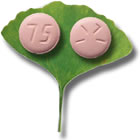| << To Blog Home >> | |
|
|
February 7, 2010 -- 11:10pm EST Herbal
Supplements vs. Heart Drugs: Controversy Re-ignited
The JACC article details the significant amounts of money ($34.4 billion) expended annually in the U.S. on Complementary and Alternative Medicine (CAM). The authors calculate over $5 billion is spent out-of-pocket on herbal supplements alone. Yes, that's $5 billion -- the total worldwide market for drug-eluting stents -- perhaps executives at Medtronic or Boston Scientific might be thinking, "maybe we're in the wrong business". In any case, the JACC paper details a number of herbs, natural substances and preparations that have an impact on the cardiovascular system -- from helping lower high blood pressure by dilating arteries, to increased antiplatelet effects to keep blood from clotting. These all sound like useful and good qualities. But, as the authors point out, problems may occur, as in "too much of a good thing". The CAM forces are unhappy with what they claim is the implication that herbal and natural supplements are unsafe. But I think this misses the major point of the paper. Quite the opposite, the paper details the ways in which herbal supplements are powerful medicines. If, for example, you have had a stent implanted and are on dual antiplatelet therapy (aspirin and clopidogrel) to keep from developing dangerous blood clots in the stent, you may think it would be a good idea to also take Ginkgo for "cardiovascular health" to keep the blood even more slippery. Yet Ginkgo intensifies the antiplatelet drugs to the point where bleeding complications may arise and may cause internal hematoma or hemorrhage. So it's not that ginkgo is unsafe -- it's that it has a very definite effect. And so with other supplements that affect the cardiovascular system. Some covered in the JACC article are: St. John's wort, motherwort, ginseng, garlic, grapefruit juice, hawthorn, saw palmetto, danshen, echinacea, tetrandrine, aconite, yohimbine, gynura, licorice, and black cohosh. The important point of this paper is that patients and physicians should be talking to each other about alternative supplements, and making sure they are taken into account when drawing up a medical management plan -- to ensure there are no interactions or unwanted enhanced effects. To rebut the implication that physicians currently do not query patients about herbal supplements, CRN has published the results of a survey, showing that, in fact, patients and cardiologists DO discuss them to a high degree. I wonder if that is really the norm and would welcome comments. |
|


 An article, that should be of special concern
to stent and angioplasty patients, appears in the current Journal
of the American College of Cardiology (JACC). This "state-of-the-art
paper" from the Mayo Clinic, titled "
An article, that should be of special concern
to stent and angioplasty patients, appears in the current Journal
of the American College of Cardiology (JACC). This "state-of-the-art
paper" from the Mayo Clinic, titled "